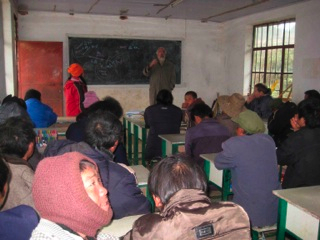Casa Ricci Social Services has been serving leprosy and HIV-AIDS infected`and affected people in mainland China for decade. We work with individuals and communities to understand and heal the different wounds that discrimination and marginalization cause in their individual and social life.
During the last 10 years of working with and in these communities, we learnt that discrimination results in isolation, which not only affects their bodies (physical disabilities), but also distort the way they understand and relate to themselves and to others, together with the way they relate with their natural environment.
Reconciliation to restore communion in these communities became a learning process of rediscovering needs and values. By learning how to care for their physical wounds to achieve physical health, they slowly rediscover the value of the individual person. Then, by learning how to work together to achieve economic development, they rediscover the need they have of the other and the value of the community life. Finally, by learning how to take care of their natural environment, they rediscover their need for water, land, and forest, and how these resources are gifts given in the natural environment where they live, and shared with other communities as well.
In one leprosy village in south China, we started 10 years ago taking care of the elderly and the sick. Some years ago, we worked with the younger members of the community, organizing credit unions with them to contribute to their economic development. During this process, members of the community discovered that credit unions would never flourish and economic development would never be achieved, unless they overcome the egoism and dependency they learnt from their history of isolation and discrimination. It was then that we decided to start a value education program, where members of the community re-learnt values such as peace, cooperation, and simplicity.

This was when they discovered that respect and ne%d of the “other” are needed to achieve a sustainable life. It is not limited to their own community, but should be extended to include their neighbour villages as well. By rediscovering water as a communal resource, they realised that reconciliation with others and respect and responsibility for others and their land should regulate not only their own community life, but their relations with other communities as well. In other words, people in the village started to learn how reconciliation with creation requires also reconciliation within themselves and other communities as well.
Fr Fernando Azpiroz, SJ is Director of Casa Ricci Social Services, a Jesuit social services organization based in Macau. He succeeded its founder, Fr Luis Ruiz, SJ who passed away last July 2011. To find out more about Casa Ricci Social Services, visit www.casaricci.org.
This article was first published in EcoJesuit.com.






